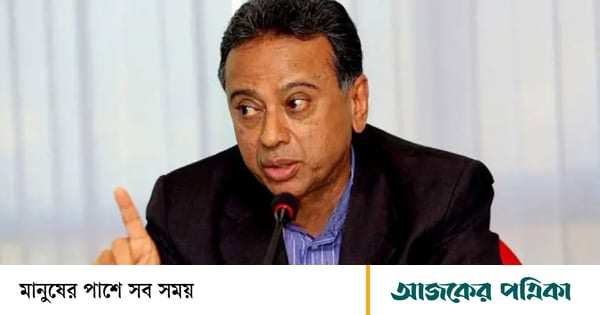BNP Standing Committee member Amir Khosru Mahmud Chowdhury believes that Bangladesh-India relations can progress by not interfering internally.
Today Friday Dhaka University (DU) Professor Mozaffar Ahmed Chowdhury in the auditorium to find a solution to the water distribution crisis between India and Bangladesh 'Question of water from the same river and India: What is the politics of solution?' He expressed this opinion in a seminar titled
Amir Khosru Mahmud Chowdhury said, 'Bangladesh-India relations can move forward by maintaining mutual respect and not interfering in the internal affairs of the country. We have to make a new statement according to what is said in the international law on rivers. The dysfunctional National River Conservation Commission should be made effective.
The speakers in the seminar opined that a new position should be established with a uniform river in the light of international water law. They said, 'National interest should be given priority. We need to preserve our rights on rivers by making the dysfunctional National River Protection Commission effective.'
Speakers pointed out that after the partition of India in 1947, no solution was given to the issue of international rivers. It is important to solve these issues.
Hossain Zillur Rahman, an economist and a former advisor to the caretaker government, said, 'What is the need of India should not be the first lesson when analyzing where the politics of solution is. It is necessary to discuss with India depending on the current and future needs of Bangladesh. Apart from India, there are many neighboring countries. We have to maintain a balanced relationship with everyone.'
Researcher Altaf Parvez said, Bangladesh's ruling class has seen two types of India policy; Blind loyalty to India and anti-Indianism. The blind loyalists did much to propitiate India but did not find any solution to the river question. And those who adopted the policy of anti-India, their activities were also limited to gaining popularity. Neither was able to bring about any settlement of the river question. If we want to find a solution to the river problem, we have to focus on the geopolitics of South Asia.
Abdullah Kafi Ratan, Chairman of the Communist Party of Bangladesh (CPB), Mohammad Ejaz, Chairman of the River and Delta Research Center, Researcher Afifa Razzak Muna, Deepti Dutta, a teacher of the Department of Oriental Art of DU, Sheikh Rokan, Secretary General of Riverine People, etc., also spoke at the seminar. Unity for Bangladesh spokesperson Manzoor Moin presided over the seminar.

